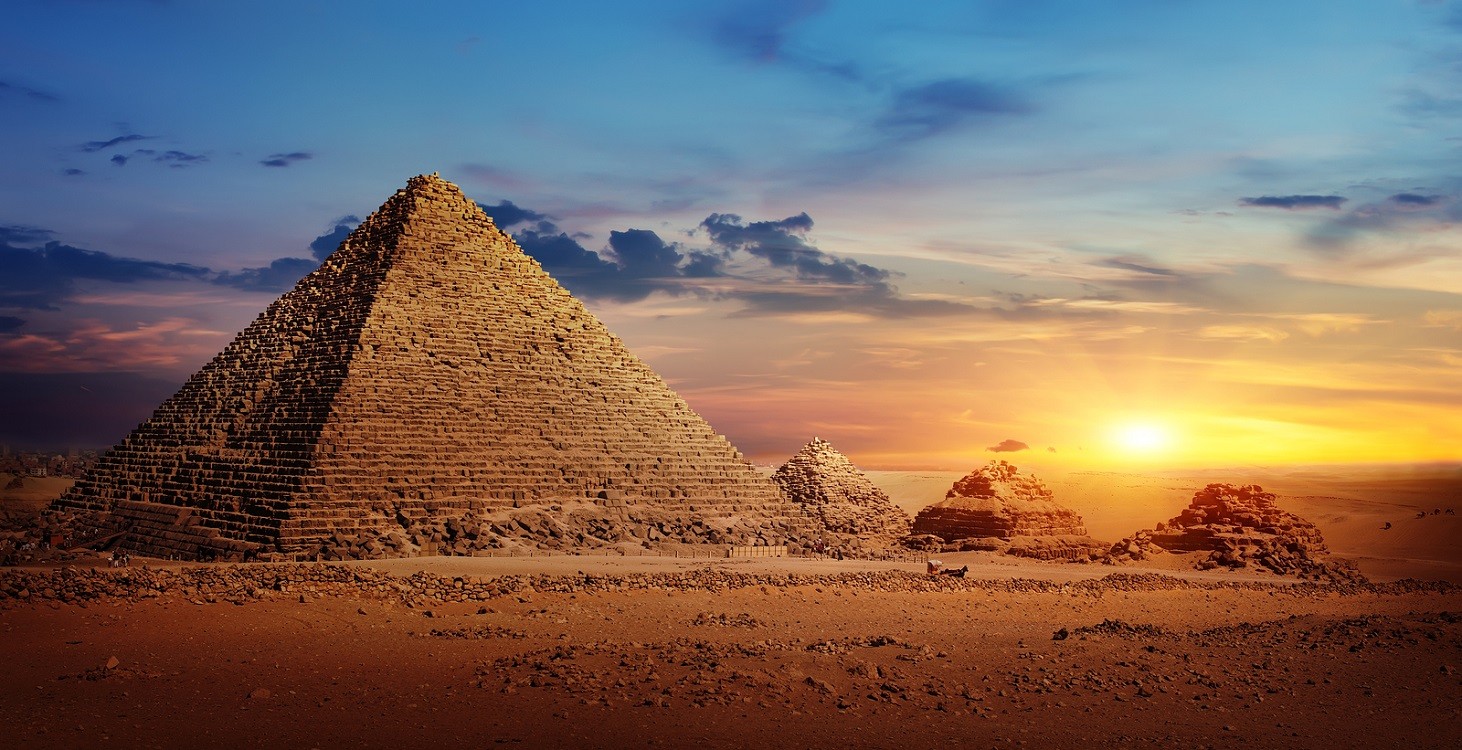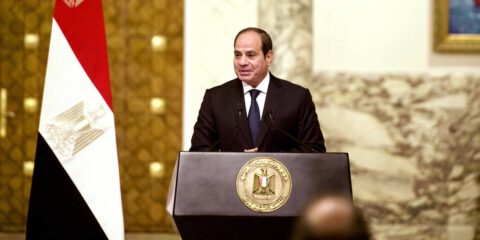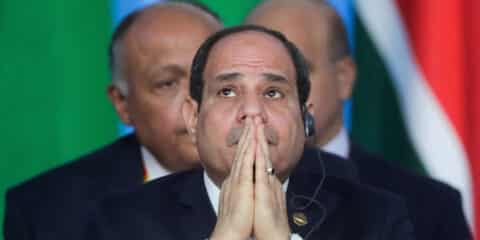מצרים מתחילה אולי לצאת מתוך ההתכנסות האסטרטגית שכפתה על עצמה.
מאז ההפיכה בשנת 2011 מצרים אינה מטילה את מלוא משקלה על מאזני העוצמה האזוריים. היא ויתרה במידה רבה על בכורתה כמנהיגת העולם הערבי, והסכינה לנטילתה על ידי גורמים מנוסים פחות אך נלהבים יותר, כמו יורשי העצר של ערב הסעודית ושל מדינת האמירויות הערביות המאוחדות (מאע”מ). אלו גם מימנו וסייעו בתזמור המחאה ההמונית וההתערבות הצבאית נגד ממשלת האחים המוסלמים הנבחרת במצרים, ועליית הנשיא עבד אל-פתאח א-סיסי לשלטון. כעת, אנו עדים לסימנים הראשונים לשינוי. ייתכן שמצרים מתחילה לצאת מתוך ההתכנסות האסטרטגית שכפתה על עצמה. זאת בשל שילוב של הישגים בזירה הפנימית, והתפתחויות משמעותיות עבור מצרים – חלקן מדאיגות, וחלקן חיוביות מנקודת מבטה – בסביבתה הקרובה.
בזירה הפנימית, המצרים הצביעו בסוף אפריל, במשאל-עם בזק, על תיקונים חוקתיים שאושרו ימים מספר קודם לכן על ידי הפרלמנט. בין היתר אלו מאריכים את כהונתו של הנשיא מארבע לשש שנים, ומגבילים אותו לשתי קדנציות; מחזקים את תפקידו של הצבא בפוליטיקה ובביטחון הפנים; מקימים מחדש בית עליון, ששליש ממנו מתמנה על ידי הנשיא; מגבירים את השליטה של הנשיא על הרשות השופטת, והחשוב ביותר, אושר תיקון המאריך את כהונתו הנוכחית של סיסי לשש שנים ומאפשר לו לרוץ לכהונה נוספת של שש שנים, ב-2024. לאחר בחירתו הצפויה אז, הוא יהיה נשיא עד לשנת 2030, כהונה של שבע עשרה שנה.התפתחויות אלו אינן סותמות את הגולל על העיסוק של סיסי בהסדרת המערכת הפוליטית הפנימית ובמלחמה באיומים עליה – בדגש על כתישת האחים המוסלמים המובסים, והלחימה בג’יהאדיסטים המזוהים עם דאע”ש בסיני. עם זאת, נראה כי יוכל לרוות נחת כרגע, ולהתפנות גם לעיסוקים רחבים יותר.חיזוק מעמדו הפוליטי של סיסי והבטחת אחיזתו בשלטון מתרחשים בתקופה של התפתחויות בסביבתה המיידית של מצרים העלולות לערער את יציבותה, כולל בשניים משלושת שכניה המיידיים – סודאן ולוב, ורחוק יותר, היציבות באלג’יריה מתרופפת. התפתחויות אלה נוגעות ישירות באינטרסים ובביטחון הלאומי המצריים, ומביאות את סיסי למדיניות פעילה ומשפיעה יותר, מעודד על-ידי הצלחתו הפנימית.בצירוף נסיבות מוצלח, סיסי הוא יו”ר האיחוד האפריקאי (African Union) מפברואר 2019 עד פברואר 2020, תפקיד שמקנה לו משקל רב עוד יותר בתזמור התגובה האזורית להתפתחויות. כך למשל, הוא שכנע את האיחוד האפריקאי להאריך את פרק הזמן המוקצב ל”מועצת המעבר הצבאית” של סודאן להעברת השלטון לממשלה אזרחית מחמישה עשר ימים לשלושה חודשים, ובכך לאפשר לצבא הסודאני להתארגן באופן מיטבי להמשך ההתמודדות הפוליטית במדינה. הוא גם דחק באיחוד האפריקאי לתמוך ב”צבא הלאומי הלובי” של המרשל ח’ליפה חפטר בלוב. ראוי לציין כי התפתחויות בגבול היבשתי השלישי של מצרים, בין סיני לעזה וישראל, מותירות מאז 2011 את קהיר מעורבת עמוקות, בשל ההתקפות הג’יהאדיסטיות שם ומשם על מטרות מצריות, וכן מיקומה של מצרים כ”שומר הסף” לרצועה. קהיר משמשת המתווכת המרכזית בין ישראל לחמאס, ובתחום זה נותרה שחקנית אזורית, ובמידה מסוימת גם בינלאומית, חשובה ביותר.הן בסודאן והן באלג’יריה, ההנהגה הצבאית היא הפוסקת לגבי ההתפתחויות העתידיות, לאחר נפילתו של רודן ותיק כתוצאה מלחץ עממי מאסיבי ברחובות. זהו רגע “מצרי” מאוד, דומה מאוד להתפתחויות של 2011 בקהיר. שני הצדדים בשני המאבקים הפנימיים, כמו גם תומכיהם החיצוניים – בריאד, בדוחה, באבו דאבי ובאנקרה – מודעים היטב לתקדים המצרי שבו הצבא התערב כדי “לשמור על הסדר הציבורי” וקטע באיבו תהליך אפשרי של שינוי פוליטי משמעותי. למשטר במצרים יש כעת הזדמנות לעצב משטרים דומים בגבולות מצרים ובאזור שלה; אם לא יעשה זאת, ייאלץ להתמודד עם מודלים מוצלחים של מעבר למשטרים מייצגים יותר, או עם תוהו ובוהו, כשאף אחת מאפשרויות אלו לא תשרת את האינטרסים המצריים. המפגינים בח’רטום מבינים זאת, ומבטאים בפומבי חשדנות רבה כלפי כוונות קהיר.
בינתיים, בלוב, בעל הברית של מצרים, ח’ליפה חפטר, מתקדם משמעותית בשבועות האחרונים, סוגר על טריפולי ופורס בכוח הזרוע את שלטון “הצבא הלאומי הלובי” על רוב חלקי המדינה. בהינתן הצורך לשלוט על אזור הגבול המצרי-לובי במזרח, ולהפחית את כוחם של האחים המוסלמים בתוך הממשלה החוקית במערב, אין זה מפתיע שמצרים הייתה נחושה בדעתה להתערב ולעזור להצלחת חפטר. מצרים ובעלות בריתה רואות כנראה הזדמנות לסיים שנים של שלטון מחולק ולא יעיל ושל תוהו ובוהו באמצעות כיבוש צבאי, ואז, ככל הנראה, שלטון אוטוריטרי על בסיס צבאי.
סיסי לא הסכים בשנים האחרונות עם ההתמקדות, אפשר גם להגדיר האובססיה, הסעודית באיראן. מצרים אף הודיעה בשבועות האחרונים לבעלות בריתה כי לא תשתתף ב”ברית הביטחון המזרח תיכונית” האנטי-איראנית (MESA, המכונה “הנאט”ו הערבי”), המקודמת על ידי המועצה לביטחון לאומי של ארה”ב. התפתחות זו תהפוך את היוזמה לרעועה עוד יותר. סיסי גם שמר מרחק מההרפתקה של אבו דאבי וריאד בתימן, ובמשך שש השנים האחרונות התנגד למדיניותן בנוגע למשטר אסד.
עם זאת, עם תחילתו האפשרית של “הגל השני” של ההתקוממויות הערביות, באלג’יריה ובסודאן, הוא והן חזרו לאותן תובנות. הם חזרו יחד למצב שבו הם נתקלו ב-2013/2011, כאשר התנועות העממיות הפילו משטרים אוטוריטריים ואיימו ליצור הסדרים פוליטיים ליברליים, או לפחות עממיים, חדשים באזור. קיים גם האיום כי פוליטיקה דמוקרטית יותר באלג’יריה ובסודאן תגדיל את כוחם הפוליטי של האיסלאמיסטים. על התנגדות למגמות אלו, כל השלושה יכולים להסכים.
סיסי זכה גם להצלחה משמעותית ביחסיו עם ארצות הברית. לא זו בלבד שביקורו בבית הלבן (9 באפריל) גרם למה שנראה כשינוי כיוון במדיניות האמריקאית בלוב, מתמיכה בממשלה בטריפולי לתמיכה בחפטר; הוא גם תרם להחלטה של הנשיא טראמפ להגדיר את האחים המוסלמים כארגון טרור. מצרים כבר משתפת פעולה באופן הדוק עם רוסיה – שהיחסים עימה תחת סיסי פורחים בשקט – בלוב ובמיוחד בתמיכה בחפטר. השגת התמיכה של וושינגטון ומוסקבה גם יחד למדיניות המועדפת על מצרים היא הישג מרשים עבור סיסי ובעלות בריתו במפרץ.
מבחינה גאופוליטית, מוקד ההתפתחויות במזרח התיכון עובר, בינתיים, לחלקו המערבי של העולם הערבי (סודאן, לוב, אלג’יריה, עזה), שבו למצרים אינטרסים ישירים וחיוניים, והיא עדיין הכוח האזורי המרכזי, שנהנה מיתרונות רבים. נראה שזה הרגע שבו המאורעות משתלבים כדי לאפשר למצרים, וגם לחייב אותה, להתעורר ולחזור – ולו חלקית – לתפקידה ההיסטורי, לפחות בקרב שכנותיה הקרובות.
סדרת הפרסומים “ניירות עמדה” מטעם המכון מתפרסמת הודות לנדיבותה של משפחת גרג רוסהנדלר.
תמונה: Bigstock








 - בניית אתרים
- בניית אתרים